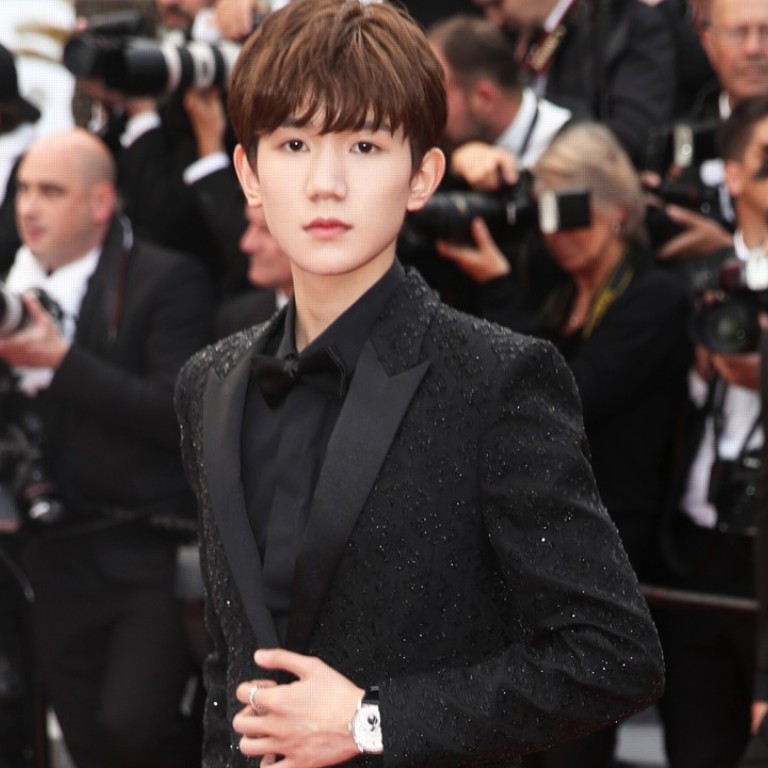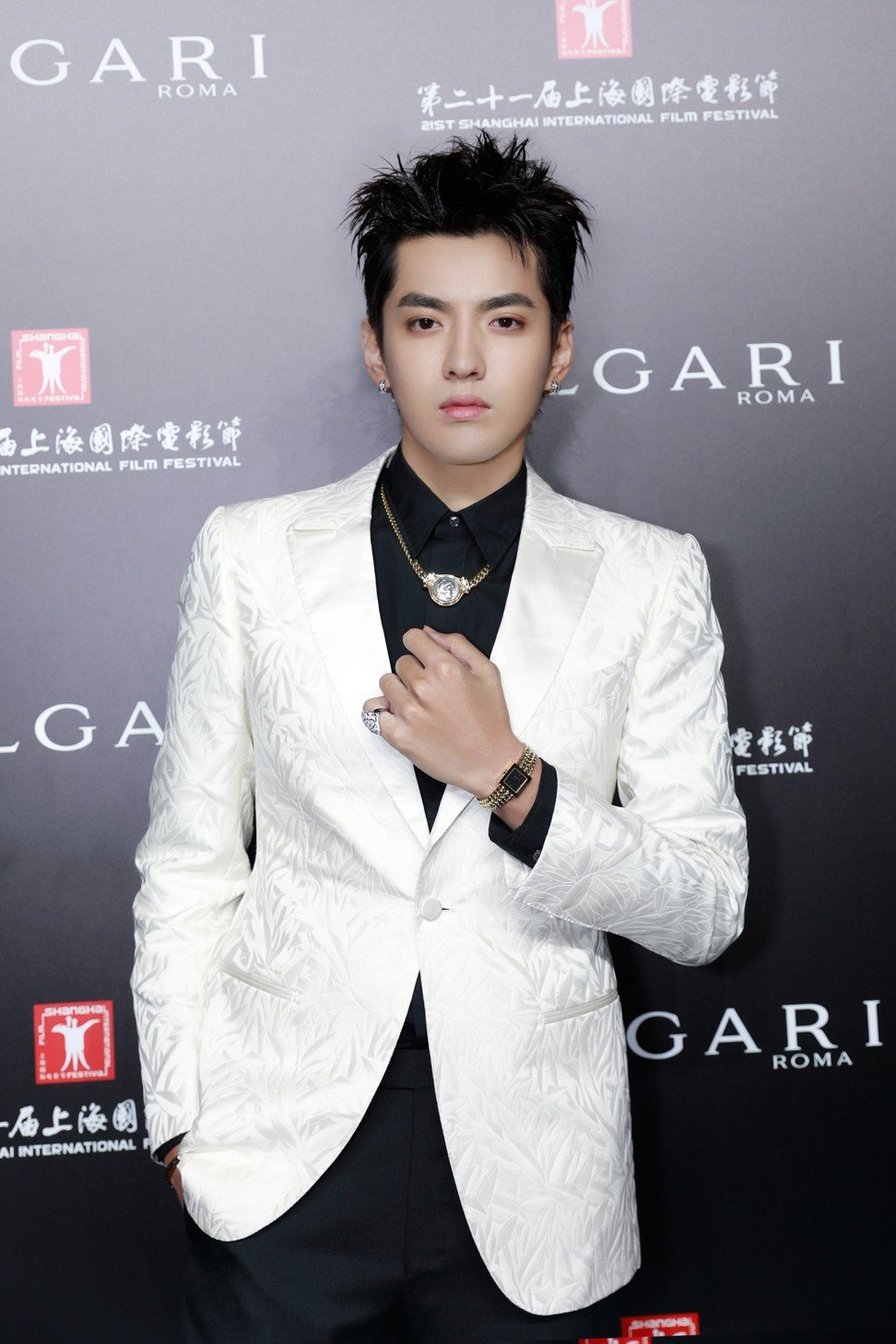
China’s ‘little fresh meat’ teen male heartthrobs milk their fame to sell fashion and beauty products to young women
Known as ‘little fresh meat’ for their soft, feminine features and cute personalities, Chinese teenagers who make their name on TV talent shows are hot properties because of their enormous fan bases
Less than a year ago, few knew his name. Now the little brother of actress Fan Bingbing is one of China’s hottest “little fresh meat” stars, wooing millions of fan girls with his boyish good looks and talent – and all thanks to hit Chinese television talent show Idol Producer.
Spanish luxury fashion house Loewe didn’t miss a beat. As viewer votes piled in and catapulted Fan Chengcheng into the final nine contestants for the show’s top prize, Loewe invited Fan to attend the debut of its summer capsule collection pop-up store in Beijing. Fan was only 17.
How fashion influencer and KOL Peter Xu is changing social media in China
It wasn’t the first time a luxury brand had used “little fresh meat” for a collaboration in China’s fashion and beauty industry.
“Little fresh meat,” or xiao xian rou, is a Chinese buzz phrase that emerged around 2014, used in the entertainment realm to label attractive, rising male celebrities born after 1990.
They’re known for their soft, feminine features and cute personalities. But it’s their ability to attract enormous fan bases on social media that has made “little fresh meat” sought after stars not only in the film and entertainment industry but by brands hoping to reach young, mostly female consumers.
Celebrity marketing is known in China to have a major influence on consumer purchasing decisions – the Alibaba Research Institute reported last year that every day, around 4.5 million people searched for products on Taobao that were endorsed by celebrities.
Meanwhile, women are driving the “she economy”, which is expected to be worth US$700 billion by next year. Together, these dynamics – plus the fact that the younger fans of the “little fresh meat” are extremely digitally savvy – have made the industry a no-brainer for luxury brands, especially those marketing products to women.
French cosmetics brand L’Occitane, for example, attributed its double-digit growth in China last year to its partnerships with “little fresh meat” stars Joker Xue and Lu Han.

Some of the “little fresh meat” stars that emerged a few years ago have gone on to become what marketing and branding agency Creative Capital founder Louis Houdart calls “spicy meat”. The likes of 27-year-old Kris Wu, who left K-pop boy band EXO in 2014 to start his solo singing career in China, has noticeably evolved his look from fresh-faced star to a more mature influencer as an ambassador for both Burberry and Bulgari.

His superstar status has attracted more than just a fan club – it’s attracted a tribe. After struggling to achieve success as a film star, Wu took his musical ambitions to new heights. Last month, Wu became the first Chinese singer to make the Billboard Hot 100 chart, and in April, he made history as the first Chinese star to be signed on to Universal Music Group.
Other “little fresh meat” stars have simply grown up. The members of TFBoys, a Chinese boy band trio formed in 2013, are now 17 and 18 years old and are among the most talked about “little fresh meat” of recent months. Two of them appeared in a spread in Vogue China’s millennial-focused magazine VogueMe in April featuring four of China’s most influential young celebrities.
“When we look at some of the ‘little fresh meat’, what’s quite interesting about TFBoys in particular is when they started about five years ago, they had two types of fans: kids who were the same generation as them, 10-13 years old, and millennials. Today, their fans of five years ago are now consumers who consume today. They have managed to grow up with their consumers,” Houdart says.
While there’s no official luxury collaboration as of yet, one TFBoys member, Jackson Yee, has formed an official partnership with Adidas neo as the brand’s first “international youth creative ambassador”. TFBoys star Roy Wang’s presence, meanwhile, helped elevate Swiss luxury watch brand Chopard’s social media presence at Baselworld. He is also a brand ambassador for L’Oreal and joined it for a live-streaming event during this year’s Cannes Film Festival in France.

No “little fresh meat” seem too youthful for luxury brands, a factor that fashion houses have typically been cautious about in other markets.
“In China, brands target the teenage crowd, because unlike in the US, teenagers solely rely on their parents until they’re about 21 or 22, and they will do anything for them and spoil them because they’re only children,” says Deana Gao, founder and CEO of digital marketing agency China Gravy. “So the luxury brands target these people because they know these teenagers are very loyal and they have the spending power.”
The trick, as with working with any key opinion leader (KOL), is finding a celebrity who can relate to their millennial and teenage followers – “[those] who are very daring, very open and have a strong understanding of what they like and dislike,” Houdart says.
“A lot of younger KOLs are brand native in that they grew up with brands,” Houdart says. “More of them can share with their followers their insight and passion about the brands, so having the right connection is even more important than before.”
However, brands may want to be wary of being too reliant on “little fresh meat”, Houdart says. In China, social media trends change so quickly that the number of celebrities filed under this label this year seems endless, which isn’t necessarily a good thing.
“We have absolutely insane numbers of ‘little fresh meat’ sourced from Chinese pop talent shows, to singing competitions, to hip hop shows,” says Houdart.
Made in China can mean high quality
“It’s a very quick turnover, and I would think the life expectancy on WeChat and Weibo of xiaowanghong (young internet celebrities) is definitely getting shorter and shorter. It’s still an interesting way to get quick access to a large number of young, newer consumers, but most are absolutely not loyal.”

